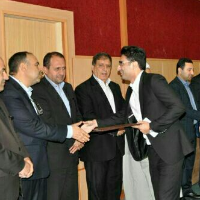Study of Stakeholder Attitudes toward Sustainability of Ecotourism Development (Case Study: Rural Areas of Javaherdeh in Ramsar)
Author(s):
Article Type:
Research/Original Article (دارای رتبه معتبر)
Abstract:
Introduction
Ecotourism is the most sustainable form of Natural resource-based tourism. That due to its innovative role in the sustainable development, it can be a perfect pattern for the entire tourism industry and for this reason should support policies and programs that are in the field of ecotourism. City of Ramsar in general and Rural Complex of Javaherdeh in particular, has a high power of ecotourism and encompasses all forms of it (KiaKojuri & Mirtaghian, 2013). It is true that ecotourism is the cause of destination sustainable development, but the paradox of ecotourism is rooted in that when it became more popular and more inclusive, its supply is also more difficult (Smit et al., 2010).Ecotourism development in recent decades in Rural Complex of Javaherdeh accompanied with profound influence on the economic, socio-cultural and environmental dimensions (Economic benefits In contrast, socio-cultural and environmental costs) and Evidence shows, there is a large gap between theory and practice in the field of ecotourism sustainable development in this area. It means that development trend of ecotourism going to unsustainable situation. Therefore, the aim of this study was to evaluate the interactive relationship between components of sustainable development ecotourism in Rural Complex of Javaherdeh.
Materials and Methods
This study is a Practical and descriptive research. Participants of this study include of three groups: local community, ecotourists and authorities. The required sample size was determined for each group of 150 people (totally 450 people). For data collections were used Standard questionnaires. Validity of the questionnaire was formally verified. Reliability of the questionnaire was calculated for the local society (0.792), tourism (0.779) and officials (0.771) which were a good value. Data analysis was done at two levels; descriptive (percentage, frequency of demographic variables) and inferential (single sample t-test) through SPSS24 software.Discussion and
Results
Results indicate that in between all of components of sustainable development ecotourism in Rural Complex of Javaherdeh of ramsar, Relational aspects for impacts of local community on officials (resources) with an average (X= 3.5) and Relational aspects for impacts of officials (resources) on ecotourist with an average (X= 3.3) Respectively have The most desirable type of relationship and also the most undesirable type of relationship Regarding to impacts of local community on ecotourist with an average (X= 1.85). Other relationship In order to be more to less unsustainability: impacts of ecotourist on officials (resources) with an average (X= 2.3), impacts of local community on officials (resources) with an average (X= 2.55), impacts of ecotourist on local community with an average (X= 2.65). These results are consistent with other research achievements (Salehi et al., 2014; Hashim et al., 2015; Mollt, 2015; Akbarian-Ronizi, 2016, Tisca et al., 2016).Conclusions
In recent years, Ecotourism as a major economic factor of sustainable development is taken into consideration and that's why it will try to the extent possible, Prevent the effective factors in reducing the flow of ecotourism and Provide essential resources for its growth and development. Ecotourism can bring Socio-cultural sustainability for local community in rural area and through income distribution; employment and poverty reduction cause the social sustainable development and make Welfare and public health. In addition to, today, environmental issues are at the core of planning, but a lot of plans and projects of ecotourism, has been done regardless of its environmental impacts. Environmental sustainable development in ecotourism, meaning that Matched development with the preservation of biological environmental processes and relevant resources of ecotourism.The results show, components of sustainable development ecotourism in Rural Complex of Javaherdeh in Ramsar (local community, ecotourists and officials) have Poor quality and according to the assessments and Practical nature of ecotourism in relation to resources and local community, pattern of ecotourism development is in an unsustainable and undesirable condition in Rural Complex of Javaherdeh and Continue the process of development pattern lead to damage to the local community and Irreparable damage to resources of Rural Complex of Javaherdeh
Language:
Persian
Published:
Journal of Tourism Planning and Development, Volume:7 Issue: 25, 2018
Pages:
72 to 96
https://magiran.com/p1899415
دانلود و مطالعه متن این مقاله با یکی از روشهای زیر امکان پذیر است:
اشتراک شخصی
با عضویت و پرداخت آنلاین حق اشتراک یکساله به مبلغ 1,390,000ريال میتوانید 70 عنوان مطلب دانلود کنید!
اشتراک سازمانی
به کتابخانه دانشگاه یا محل کار خود پیشنهاد کنید تا اشتراک سازمانی این پایگاه را برای دسترسی نامحدود همه کاربران به متن مطالب تهیه نمایند!
توجه!
- حق عضویت دریافتی صرف حمایت از نشریات عضو و نگهداری، تکمیل و توسعه مگیران میشود.
- پرداخت حق اشتراک و دانلود مقالات اجازه بازنشر آن در سایر رسانههای چاپی و دیجیتال را به کاربر نمیدهد.
In order to view content subscription is required
Personal subscription
Subscribe magiran.com for 70 € euros via PayPal and download 70 articles during a year.
Organization subscription
Please contact us to subscribe your university or library for unlimited access!



